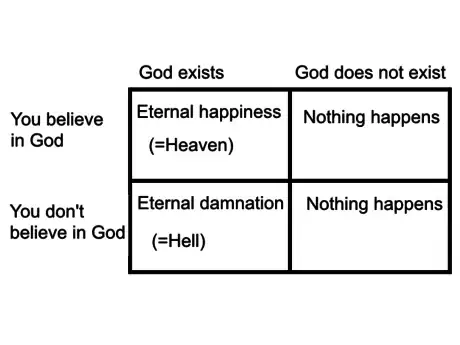X
wikiHow is a “wiki,” similar to Wikipedia, which means that many of our articles are co-written by multiple authors. To create this article, 13 people, some anonymous, worked to edit and improve it over time.
This article has been viewed 63,033 times.
Learn more...
Pascal's Wager has been one of the most frequently used arguments in favor of religious belief. Many theists have used it, to their knowledge or not. However it's far from impeccable. Consequently it can be refuted by following the steps below.
Steps
-
1Make sure you understand what Pascal's Wager is all about. To that end, let's take a look at Pascal's claims:
- If there's a God, He's infinitely incomprehensible.
- Reason can decide nothing here.
- You must wager.
- Let us weigh the gain and the loss in wagering that God is.
- There's an eternity of infinitely happy life to gain.
- If you gain, you gain all; if you lose, you lose nothing.
- Wager, then, without hesitation that He is.
-
2Explain that Pascal's Wager doesn't prove God exists, it attempts to prove that it is better to believe, regardless of whether there is a god or not. Pascal's wager merely concludes that it is better to believe in God "just in case", but does nothing to provide evidence of God's existence.Advertisement
-
3Refute infinitely happy life.
- A major problem lies in the "infinitely happy life" part. Consider what's written in the Bible; "Thou shalt worship no other gods but me". This behavioral pattern is prominent in most modern major religions, where gods demand absolute devotion. Thus, if you choose the wrong religion, you're eternally condemned.
- Furthermore, when we decide to wager in the unknowable, we must make room for future religions. After all, no religion was available to the people born before it. What's more is that there's an infinite number of unknown divine concepts, which we haven't imagined yet or can't imagine at all. None of these can be graded more or less likely than the next since they're all supernatural phenomena and cannot be observed. Consequently, there is an infinite number of possible gods and religions. For every divine concept, there's an exact opposite divine concept, which punishes the former concept or concepts.
- It becomes clear that the odds of a correct choice are too slim. There's an infinite number of possible deities and/or religions, all of which are just as likely to be correct. They're also mutually exclusive or incompatible; even when they don't overlap like similar denominations do, ideas and thus divine concepts are still infinite. For every concept an infinite number of divine concepts which punishes it exists. This means that while there can be only one correct choice, which leads to an eternally happy life, there's an infinite number of religions that punish it.
-
4Refute "you lose nothing". Religion requires you to sacrifice a lot of time, effort, and money. In fact, believing in religion comes with many responsibilities. Thus you spend time in sermons and preaching: time which could be invested elsewhere.
- There's pressure on you to adhere to the concepts of your religion. You must follow a moral code, which remains largely unchanged and most likely isn't compatible with the conditions of the present society.
- Your critical thinking is dulled. What religions advocate as facts in their sacred texts are in fact supernatural phenomena. By their nature, they're unfalsifiable claims. In order to accept the supernatural, you need to accept them as they are without reason. This will degrade your powers of reasoning.
- Subsequently believing in the unknowable comes with multiple drawbacks. So, in return for investing time in something which is possible, but by no means certain, you waste time, you dull your intellect, and take up arbitrary morals, on the only place where your rewards are certain and tangible: Earth.
-
5Distinguish between the knowable versus unknowable. Betting on unknowable claims is an unreliable way to benefit your life.
- Conversely, placing your bets on the knowable instead grants certain and tangible rewards. You sleep in a comfortable bed, eat a delicious burger, admire a masterpiece, or watch a ray of beautiful sunshine. You are entitled to those because you work hard to earn the ability to do so and because you were born in this very world. Everyday life can be boring or miserable, but it has definite great moments, all of which come from the knowable.
-
6Point out that the same logic applies to other gods as well. You can make the same argument for the Christian god, the Greek gods, the Norse gods, and for every god that was, is, and will ever be.
Advertisement
Community Q&A
-
QuestionI’m not an Atheist, but I’m not Christian. What do I do if a Christian tries to use this argument on me?
 Carolyn BarrattCommunity AnswerPoint out to him/her whatever religion that you happen to be. If the Christian is into proselytizing, then he/she will have to use a different technique.
Carolyn BarrattCommunity AnswerPoint out to him/her whatever religion that you happen to be. If the Christian is into proselytizing, then he/she will have to use a different technique.
Advertisement
About This Article
Advertisement
































































